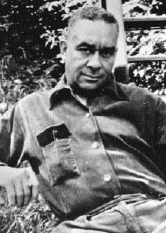September 4: Richard Wright
Richard Wright (1908)
It was on this date, September 4, 1908, that African-American writer Richard Wright was born outside Natchez, Mississippi, the son of an illiterate sharecropper father and a well-educated school teacher mother. Early on, Wright developed a fascination with books – a love of learning that only deepened his dissatisfaction with life as a black boy in the segregated South. He began to read contemporary American literature and was strongly influenced by the Sage of Baltimore – so much so that he borrowed a library card from an Irish co-worker and forged a note to the librarian, saying, "Dear Madam: Will you please let this nigger boy have some books by H.L. Mencken?"
Wright lived for a time with his grandmother, "an ardent member of the Seventh-Day Adventist Church," who made his childhood challenging with her religious fervor. He was forced to enroll in the local religious school, where he learned to despise organized religion. "I abhor the very notion of mysticism," Wright later wrote in his Blueprint for Negro Writing (1937).
When her church held a religious revival, Granny dragged Wright to it, hoping for his conversion. But Wright was defiant and said he would believe in God only if he saw an angel. When his mother persuaded him to attend a Methodist Church, he did so not because of faith, but because all his schoolmates socialized there.
Dreaming of a better life in the North, Wright moved to Chicago and worked through the Depression as a street sweeper and as a postal worker. But it was in 1932, as a member of the John Reed Club, an intellectual arm of the Communist party, that he found his first encouragement to write – without the rampant racism of the Caucasian culture. Wright left Chicago in 1937 for New York where "he could get published." His novel, Native Son, completed with a Guggenheim Fellowship, earned him critical acclaim in 1940.
In 1944 he finally broke with the Communist Party,* but continued to espouse a liberal ideology and a deep skepticism toward religion. The next year Wright published his most famous work, Black Boy (1945), an autobiography about his youth in the segregated South. In it, he not only criticizes black culture for not providing a strong foundation for its race, yet asserting that African-Americans will overcome racism, but Wright also articulates his alienation from organized religion.
He became friends with Jean-Paul Sartre and Albert Camus after moving to Paris in 1946. Wright's novel, The Outsiders (1953), shows how much of their Existentialism he adopted. Disaffection with American racism, plus fear of persecution for being an ex-Communist, prompted Wright to become a French citizen in 1947. He never saw the US again.
In his 1957 Pagan Spain, based on his travels in the Iberian Peninsula, Wright wrote:
I have no religion in the formal sense of the word. .... I have no race except that which is forced upon me. I have no country except that to which I'm obliged to belong. I have no traditions. I'm free. I have only the future." (p. 21)
The first thing, though, that I had to be clear about was my own deep non-Catholicness, my undeniable and inescapable Protestant background and conditioning, my irredeemably secular attitude, and, beyond all that, my temperamental inability to accept childlike explanations of a universe which, if it had any ultimate meaning, was surely not the kind of universe that could be represented by pictorial images of a cosmic family whose members were quarreling among themselves." (p. 231)**
Wright died in Paris, an American but an expatriate, on 28 November 1960.
* This he recounts in American Hunger, posthumous, 1977.
** Wright believed Spain was irremediably pagan, rather than Catholic, in its behavior, even while it protested a Catholic spirit. As he wrote (pp. 287-8), "Convinced beyond all counterpersuasion that he possesses a metaphysical mandate to chastise all of those whom he considers the 'morally moribund,' the 'spiritually inept,' the 'biologically botched,' the Spaniard would scorn the rich infinities of possibility looming before the eyes of men, he would stifle hearts responding to the call of a high courage, and he would thwart the will's desire for a new wisdom .... [Wright's ellipsis] He would turn back the clock of history and play the role of God to man.... How poor indeed he is. ...")
Originally published September 2003 by Ronald Bruce Meyer.


